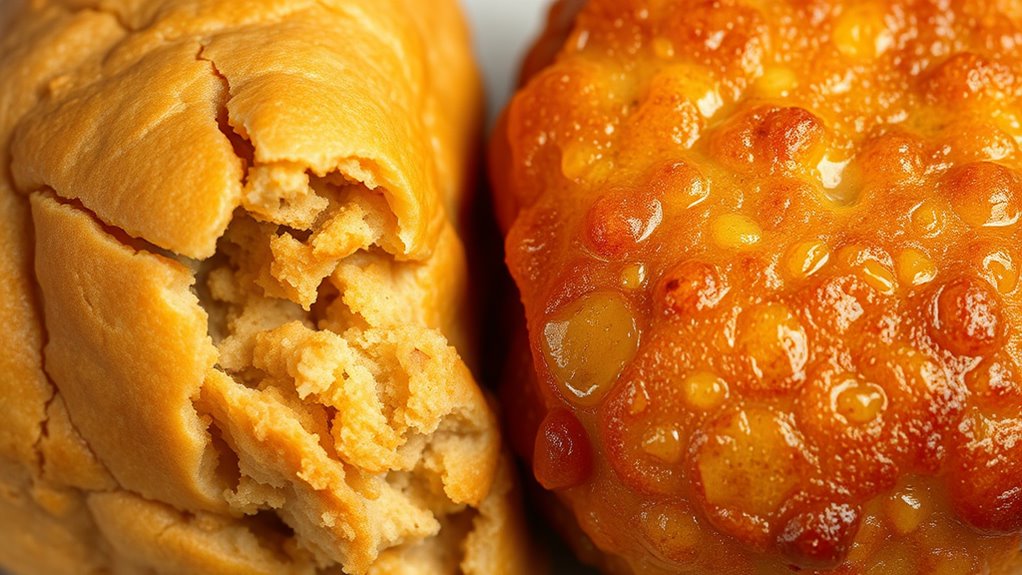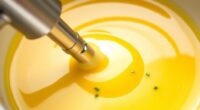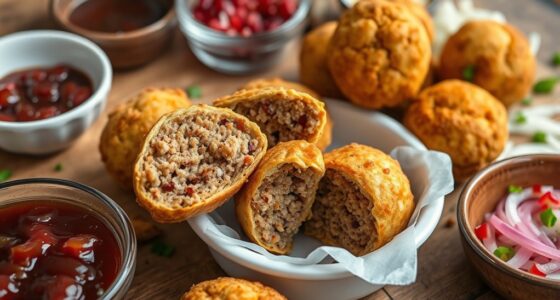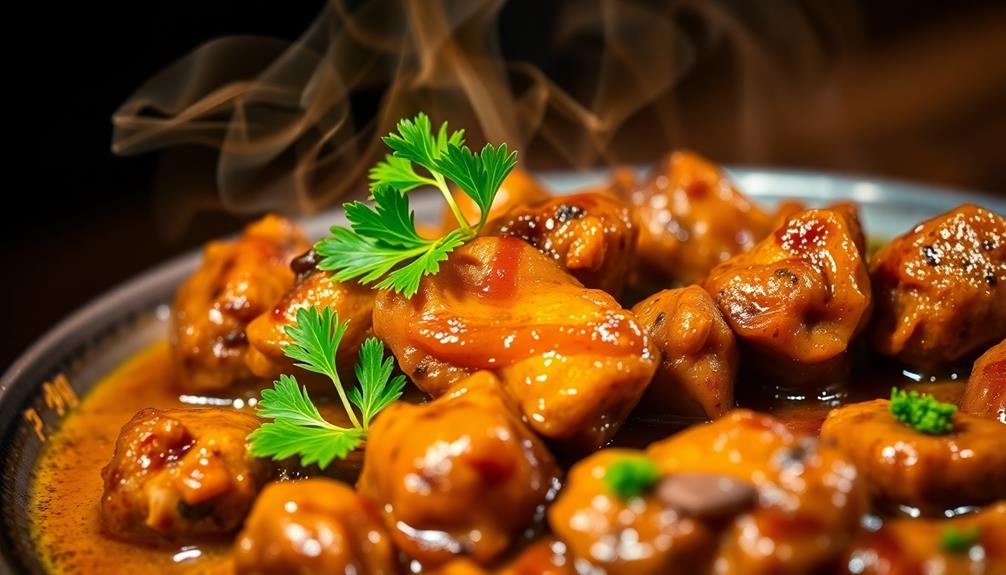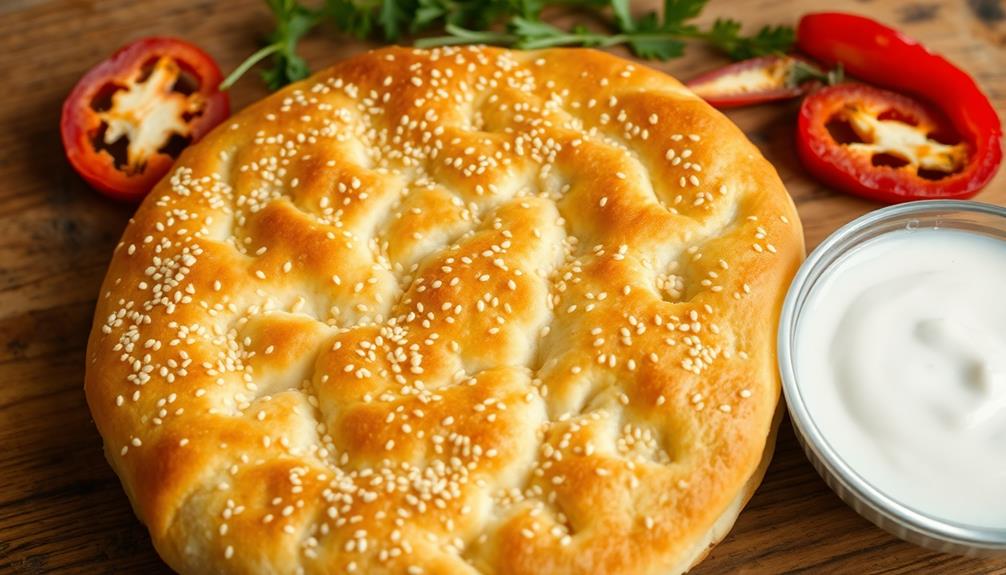When choosing between baking and frying Lebanese kibbeh, consider the texture and flavor you prefer. Frying gives you that signature crispy crust with rich, savory notes, while baking offers a lighter, less greasy bite with still satisfying crunch. Frying is more traditional and flavor-packed, whereas baking is healthier and easier. If you want to explore how each method affects your kibbeh, sticking around will reveal more tips and tricks to get the best results.
Key Takeaways
- Fried kibbeh features a crispy, golden crust with a tender interior, while baked kibbeh has a firmer, less oily exterior.
- Frying creates a deep, rich flavor and signature crunch, whereas baking offers a lighter, less greasy texture.
- Baking produces a healthier, less oily crust with a satisfying crunch, suitable for health-conscious preferences.
- Traditional frying emphasizes crispness and authentic flavor; baking provides a modern, balanced alternative.
- Hybrid methods can combine crispiness with controlled texture, customizing the overall kibbeh experience.
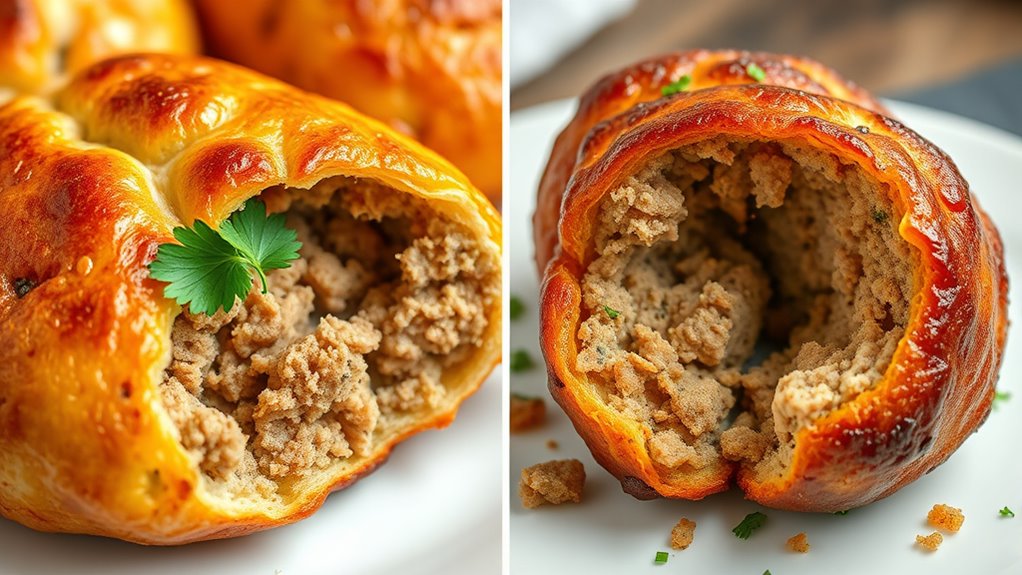
When it comes to Lebanese kibbeh, choosing between baking and frying can considerably impact the flavor and texture of this beloved dish. Both methods have their fans, but your choice can influence not only how it tastes but also its nutritional profile. If you’re aiming for healthier alternatives, baking offers a compelling option. Traditional methods often emphasize frying, which gives kibbeh its signature crispness, but baking can deliver a satisfying crunch without excess oil. This method reduces fat content, making it a smarter choice if you’re watching your health or trying to cut calories. Plus, baked kibbeh can be just as flavorful when seasoned properly, with herbs, spices, and a drizzle of olive oil to enhance its taste.
Frying, on the other hand, is the classic way to prepare kibbeh, especially in traditional Lebanese kitchens. When fried, the outer shell becomes beautifully crispy, creating a delightful contrast with the tender filling inside. This method delivers that authentic, rich flavor that many associate with traditional Lebanese kibbeh. The high heat causes the outer layer to develop a golden-brown crust, which many consider essential to the dish’s identity. However, frying also absorbs more oil, making it less ideal if you’re concerned about health or looking to reduce fat intake. Despite this, frying remains popular because it provides that irresistible crunch and a deeply savory taste that many find hard to beat.
If you prefer sticking to traditional methods, frying might be the way to go, as it’s been used for generations to achieve that authentic texture and flavor. Yet, if you’re interested in adapting the dish for modern dietary preferences, baking offers a viable alternative without sacrificing too much of that traditional appeal. You can also experiment with hybrid techniques, like lightly frying the kibbeh for a brief finish or baking it to set the shape before giving it a quick fry to gain some crispiness. This way, you can enjoy the best of both worlds—flavor, texture, and health benefits.
Frequently Asked Questions
Which Method Is More Authentic to Lebanese Tradition?
You’re wondering which method best reflects traditional techniques and culinary authenticity. Baking kibbeh offers a healthier, lighter option, but frying remains more authentic to Lebanese culinary roots, providing the richer flavor and crispy texture traditionally prized. By choosing frying, you’re honoring the classic methods passed down through generations. While both methods produce delicious results, frying is considered more true to Lebanese tradition, preserving the authentic taste and texture that defines genuine kibbeh.
How Does Baking Affect Kibbeh’s Shelf Life?
When you bake kibbeh, you’ll notice it retains moisture better, which helps keep it tender and flavorful. Baking also extends its preservation duration, making it easier to store and enjoy later. You benefit from improved moisture retention and longer shelf life, reducing spoilage concerns. So, baking not only preserves the kibbeh’s quality but also makes it more convenient for you to prepare ahead and enjoy over several days.
Can Frying Kibbeh Be Healthier Than Baking?
Frying kibbeh can be healthier than baking if you use minimal oil, reducing oil absorption and keeping calorie content lower. While frying often adds more fat, choosing healthier oils and controlling amounts can improve nutritional content. Baking, on the other hand, typically uses less fat, making it a better option for those watching their intake. So, frying can be healthier if you’re mindful of oil use and nutritional balance.
Which Method Is Quicker to Prepare?
If you’re racing against the clock, frying kibbeh is your superhero move! It’s blazing fast, drastically cutting down the cooking time and boosting your preparation speed. Frying transforms your kitchen into a whirlwind—less waiting, more tasting! Baking, on the other hand, takes a bit more time. So, if quickness is your goal, frying wins hands down, turning your culinary race into a victorious sprint.
How Do Flavor Profiles Differ Between Baked and Fried Kibbeh?
When comparing baked and fried kibbeh, you notice flavor differences mainly in spice intensity and aroma. Frying tends to enhance spice flavors and creates a richer, more aromatic profile due to the oil’s heat. Baked kibbeh offers a milder, subtler spice taste with a lighter aroma. You’ll find frying intensifies the overall flavor, while baking preserves a more delicate, nuanced taste, making each method distinct in flavor experience.
Conclusion
Whether you bake or fry your Lebanese kibbeh, each method offers a unique experience—like choosing between a gentle sunrise and a fiery sunset. I once watched my grandmother’s frying pan sizzle with anticipation, turning the exterior golden and crispy, while my baked version remained tender inside, like a soft whisper. Whichever method you pick, remember that your kitchen transforms into a culinary canvas, where your choice shapes the texture and flavor of this beloved dish, making every bite a personal masterpiece.
